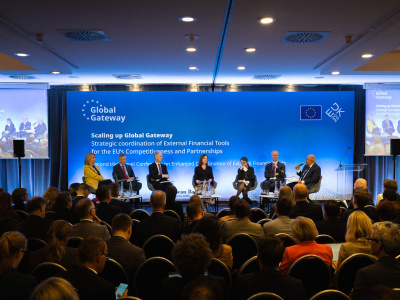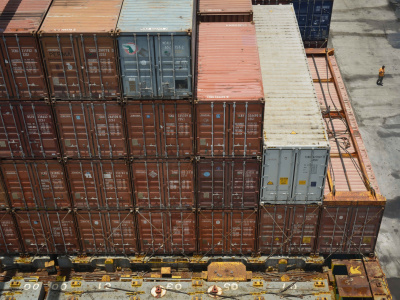
Finland is teaming up for supporting business and development
The old silos of business and development are breaking down. Finland has introduced a model, “Team Finland”, which has great potential for helping the developing countries benefit from business and trade while also advancing Finland’s economic interests.
Think back of China forty years ago. Or India twenty years ago. Thriving business, a purchasing-powered middle class or the world’s largest innovation centres were not the first things that come to mind in those days.
Look what is happening in Africa now. Did you anticipate at the turn of the millennium that six out of ten of the world’s most rapidly growing economies would thirteen years later be in Africa? If you did, you are probably doing profitable business in Africa now. The rest of us, who did not, keep pondering how all of this managed to take place without us having a clue. And most importantly: what next?
Rapid changes confuse us
The countries which were once too poor to buy even the cheapest products from the West are now becoming our rivals. Many countries which have traditionally been recipients of development aid are turning into donors. The current emerging economies have industrialised so massively that breathing air and clean water have become scarcities. Those “emerging economies to be” which stand next in the line are in a position to leapfrog over the most costly and devastating phases of growth and industrialisation.
This is especially true in Africa. Many African countries have recently made vast discoveries of natural resources. This can certainly be a blessing for domestic resource mobilisation if the upcoming revenue flows are managed wisely and used equitably.
However, only one third of Africa’s growth can be explained by natural riches. The rest comes from consumption, investment and trade. The companies around the world have recognised this. Thus the rush to Africa. The national public sectors in Europe and elsewhere in the wealthiest part of the globe are trying their best to pave the way for their own companies.
Silos are breaking
Traditionally, the business community has taken “development idealists” with great scepticism. The development aid practitioners have been extremely good at spending taxpayers’ money in operations whose long-term impacts on poverty eradication and human development have often been questionable. Business has not featured among the beneficiaries of aid. Likewise, the development cooperation people have widely shared the attitude that companies exploit the poor people, or worse impoverish them.
Today, these silos are simply old-fashioned. They are also imaginary; the world is not and has never been so black and white. In modern development cooperation, companies are one of the key partners in responding to the development needs. Companies are also increasingly engaged in community wellbeing under the rubric of corporate responsibility, mostly with their own money. Business not only enables development, business is development.
Team Finland model
The Government of Finland attempts to bring all the key players that promote Finland’s external economic relations, internationalisation of the firms, investment into Finland and the country image to the same table. For development cooperation, it essentially means dismantling the silos. This model is called “Team Finland”.
Team Finland aims at influencing global developments, integrating Finnish businesses more keenly into global value chains, identifying and utilising new emerging opportunities, and providing public services for companies in a more efficient and targeted manner. Team Finland also strives to influence the operating environment outside Finland. The focus is on the European Union as well as sizeable growth markets. In low-income markets, Finland’s Aid for Trade can offer an avenue for making the business enabling environment friendlier to both domestic and foreign businesses. Furthermore, Team Finland is charged with the task of attracting investment into Finland and improving Finland’s country image internationally.
The logic is simple: Finland as a country and Finnish stakeholders are too small to effectively achieve the above targets alone. Influencing the global developments takes all players to pull the rope together in the same direction. The Finnish economy cannot only export goods and services, it needs imports to flourish.
Finland’s foreign missions have the responsibility for coordinating and advancing Team Finland’s objectives at the country level. It has actually brought a lot more economic and commercial duties for the Embassies than before, even in countries where Finland’s external relations have been mainly focussed on development cooperation.
First concrete steps taken
The Team Finland approach was launched in January 2013. The launching event, with a good number of workshops, was attended by more than one thousand corporate and other interested participants and exceeded all expectations.
Cooperation between the Ministry for Foreign Affairs (MFA) and Ministry of Employment and the Economy (MEE) has been enhanced in many fields, including development policy and cooperation. An ongoing initiative is the MFA−MEE-led Business and Innovations for Development Task Force.
A concrete leap was taken when Finland’s Embassy to Zambia, MFA, Finpro and Human Security Finland, together with the Zambian partners, organised the Finnish−Zambian Business Partnerships Week during 16−22 May 2013. The Week consisted of a series of events, such as co-creation workshops for private sector development in mine-host community Lumwana, Zambia−Finland Trade and Business Forum as well as Women Entrepreneurship Workshop. The Business Week was part of the Ministerial visit to Zambia and Tanzania by Finland’s Minister for International Development Heidi Hautala and Minister for European Affairs and Foreign Trade Alexander Stubb – the first ever such a visit by two Ministers responsible for development and trade.
Mika Vehnämäki is the Senior Economic Adviser, D.Sc. (Econ.) at the Ministry for Foreign Affairs of Finland, Department for Development Policy.
This article was published in Great Insights Volume 2, Issue 5 (July-August 2013)



